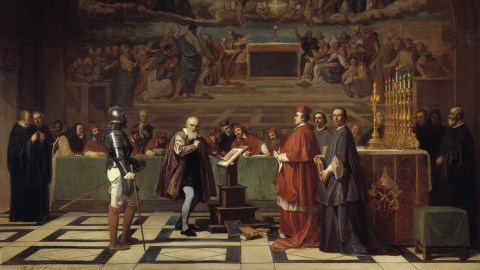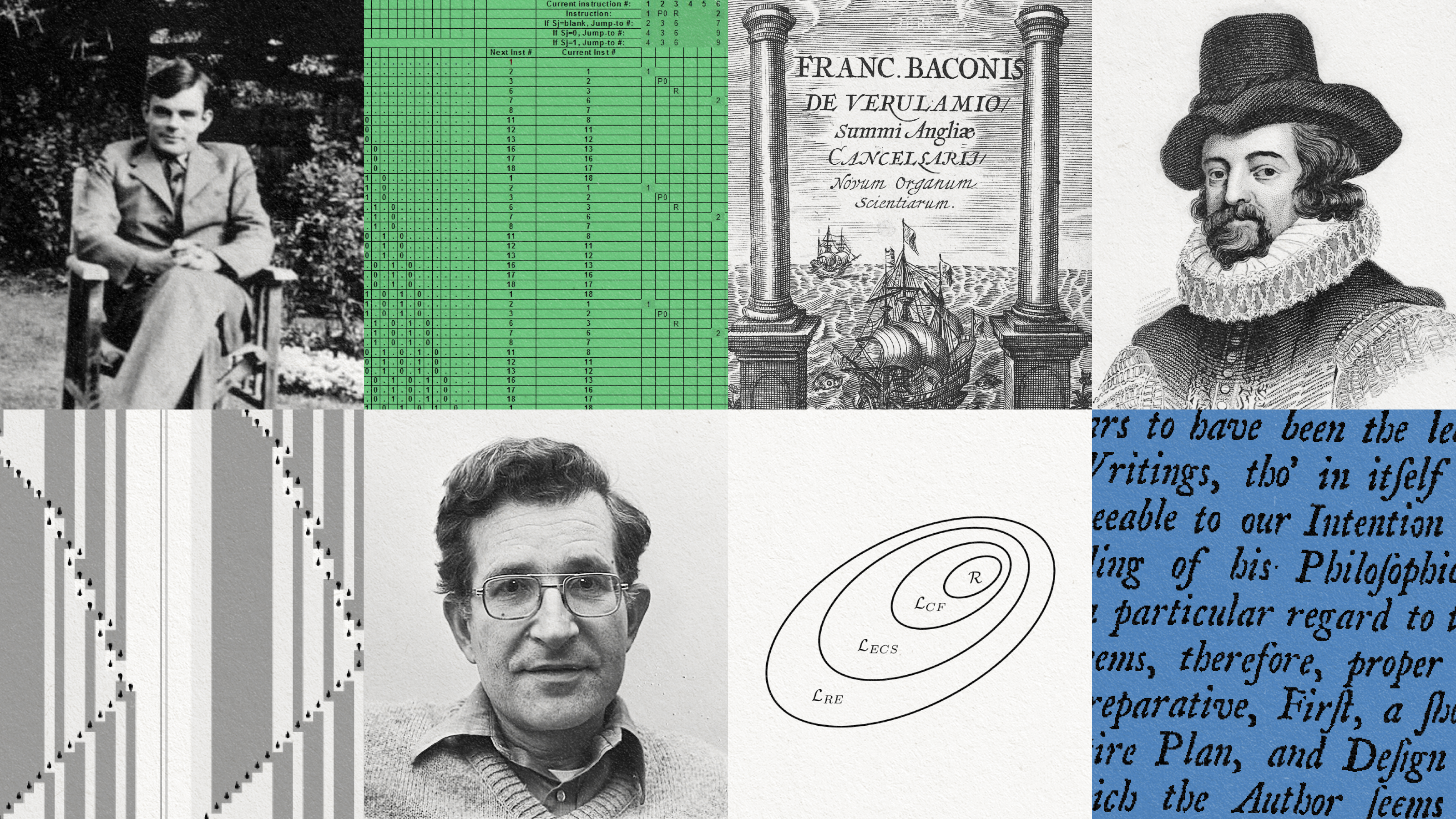How advances in philosophy made the world safer for scientists

- Scientists work in societies shaped by ideas in social and political philosophy.
- As philosophy advances, science is given the tolerance it needs to advance, too.
- While we might like to think we're more enlightened than those in the Middle Ages, modern societies have persecuted scientists, too.
While it is common to imagine scientists working alone in their labs like latter-day wizards in their tower, science today is a vast group effort done by people who live and work in societies. What they can research is determined, in part, by the conditions in their society.
Advances in social and political philosophy helped prevent some scientists who upset the established order from being executed, clearing the way for ideas that would improve the world. Comparing science before and after the rise of ideological tolerance in the West is like comparing the darkest night to the brightest day.
Science before tolerance
If there is one thing that concerns the reactionary members of an age’s establishment, it is experimentation. Even thought experiments, a favorite tool of science and philosophy, are considered dangerous in some circles. In a time before social and political philosophy established the ideas of tolerance, pluralism, and liberalism, being too outspoken with nonconformist viewpoints could be a death sentence.
To illustrate this, consider the case of the heliocentric theory in the early modern era. While it is easy to overstate the difficulties between the scientific and religious establishments — and many historians think we do — this example provides fascinating insights into what happens when the social philosophy of the day rejects tolerance for new ideas.
For instance, Copernicus only saw the first copy of his book on the heliocentric model on his deathbed. Even then, he purposefully made it so technical as to limit the possible controversy and included an introduction expressing that it could be read as a mathematical model without connection to the reality of the cosmos. While this strategy worked for him — the Inquisition never got to him — some of his supporters would be less lucky.
Giordano Bruno was both less tactful and less fortunate. He has the distinction of managing to irritate the Calvinist, Lutheran, Anglican, and Catholic establishments of 16th-century Europe with his stances regarding Copernicus’ model, the possibility of an infinite universe, and the likelihood of other worlds housing life. Secular authorities turned him over to the Roman Inquisition, who burned him at the stake over his heretical viewpoints.
More famous is the case of Galileo Galilei, who was “vehemently suspect of heresy” for his support of heliocentrism. He spent the remainder of his life under house arrest. All of his writings were banned. Most humiliatingly, the court forced him to “abjure, curse and detest” his scientific stances. In fact, Rene Descartes decided not to publish his book The World, which explained the cosmos in heliocentric terms, in light of how Galileo was treated.
The idea that the Earth moves around the Sun eventually caught on. However, this was not the end of scientists taking steps to keep themselves safe when researching topics of dubious legality. Even Isaac Newton had to avoid prying eyes peeking at his vast collection of alchemy work, which was probably heretical. His stances on Christianity were also unconventional enough to have warranted additional caution.
In Newton’s lifetime, however, the idea of tolerance as not merely sound policy but sound philosophy began its rise.
The rise and benefits of tolerance
A limited tolerance for dissent was the norm for most of human history. Even historical societies that seem more open to us today had rather narrow limits. In ancient Athens, for example, Anaxagoras of Clazomenae argued the sun was not a god. He narrowly avoided execution for this heinous crime by fleeing into exile. Socrates was not so lucky and received a death sentence for allegedly believing in strange gods.
Over the subsequent centuries, societies have slowly grown more tolerant. American philosopher John Rawls argued that the European Wars of Religion directly caused the rise of tolerance as a philosophical stance and political policy. He reasoned this was because many states failed to achieve religious homogeny through force and had to accept the presence of religious minorities.
Philosopher John Locke, working at the same time as Newton, forcefully argued for religious tolerance in his works. He is generally considered one of the first philosophers to argue for liberalism. Other enlightenment philosophers would follow in his footsteps. Even Rousseau, a French-speaking philosopher whose works can be read as either liberal or proto-totalitarian, maintained that most religious and ideological differences must be tolerated.
It took some time for their ideas to reach the arenas of policy and culture, yet progress followed nonetheless. In the 19th century, John Stuart Mill — himself denied the right to study at Oxford or Cambridge due to being a religious nonconformist — argued for wide levels of tolerance and civil rights in On Liberty. He pointed out how vital a sense of freedom was for intellectual progress of all kinds when he wrote:
“Persons of genius, it is true, are, and are always likely to be, a small minority; but in order to have them, it is necessary to preserve the soil in which they grow. Genius can only breathe freely in an atmosphere of freedom.”
Mill continues to argue that individuals must be protected from those looking to limit their ability to experiment in their lives so long as they aren’t hurting anybody else.
His ideas on how to support genius and progress are supported by history. In his book The Geography of Genius, Eric Weiner argues that many of the locations associated with clusters of genius in world history were able to attract brilliant, unconventional, and often eccentric minds through openness to new ideas and tolerance for seemingly heretical views. While we would consider many of these places intolerant by modern standards, such as ancient Athens, they proved extremely open-minded for their time.
It is difficult to imagine that many scientific advances of the last 150 years, among them Darwinian evolution, relativity, and quantum mechanics, would have made much progress without the support of arguments for allowing new worldviews and experimentation. While there is still much to be done, scientists with well-reasoned arguments or unorthodox lifestyles aren’t being persecuted anymore.
Modern memory lapses
Of course, like science, philosophy is a process. Societies have experimented with many ideas, and sometimes intolerant ones become vogue. When this happens, experimentation of all kinds, both personal and scientific, can be dangerous. There are plenty of examples of scientists enduring state-sponsored persecution within living memory. The worst have tended to be in authoritarian societies.
The most terrifying case might be that of the Soviet Union and its state-sponsored campaign known as Lysenkoism. This approach agriculture rejected genetics and natural selection in favor of a more Marxist understanding of inheritable traits. It was nonsense, but nonsense that struck a chord with Stalin, who endorsed the teaching. As in other areas of Soviet life, Stalin further endorsed going after dissenters.
Estimates of the number of biologists fired, imprisoned, or shot for objecting to the theory center around 3,000. During Lysenkoism’s reign, Soviet agricultural yields fell — at least partly due to the bizarre suggestions given to farmers — exacerbating famines that led to millions of deaths. The Soviet government also had periods where it denounced pedology, statistics, and cybernetics for ideological reasons.
Not to be outdone, factions in Nazi Germany actively denounced a great deal of modern physics as “Jewish science.” Debate continues on how severely the campaign impacted German attempts to build the atomic bomb. What is undeniable is that the persecution of the Jews drove many great minds out of Germany and severely impacted the quality of German research for years.
Then there’s the United States, where distortions of science for political ends are a matter of public record. The opinions of many atomic scientists in the 1950s led them to the unemployment line. Teaching evolution was illegal in some states as late as 1967 and remains controversial in others to this day. Universities in Florida are beginning to have difficulty keeping academics or finding new ones due to the political climate.
Science took off once philosophers began arguing against killing those who disagreed with orthodoxy. It is a lesson humanity has needed to be taught more than once. We must work so that we don’t have to learn it again.





